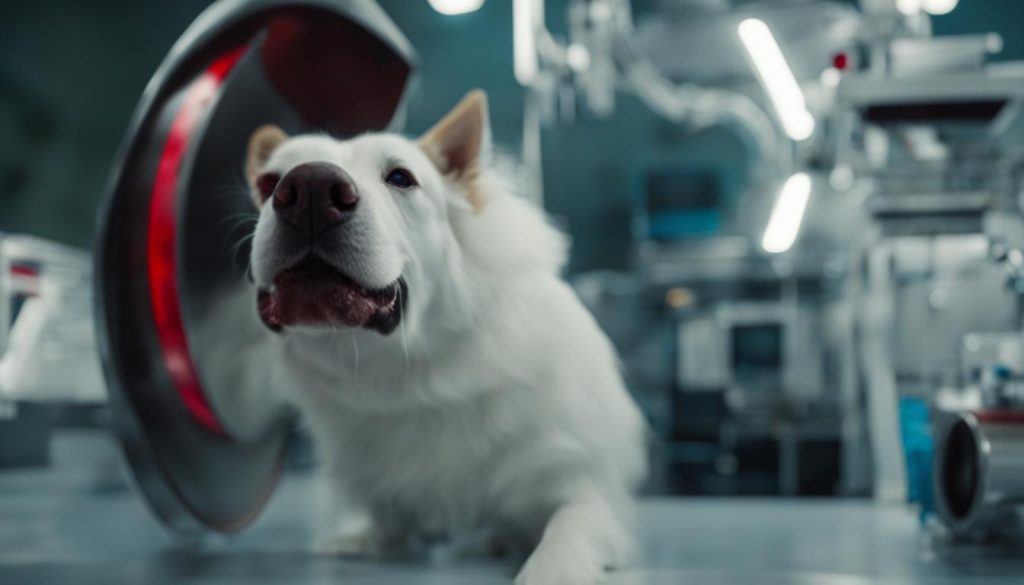As a dog owner, it can be concerning to discover blood in your furry friend’s stool. Bloody stool, also known as hematochezia or melena, can be a symptom of various conditions affecting your dog’s digestive system. Understanding the underlying causes is crucial for proper diagnosis and treatment.
In this comprehensive guide, I aim to shed light on why dogs may have blood in their stool. We will explore the different types of bloody stool, common causes of hematochezia and melena, serious conditions that can lead to bloody stool, and available treatment options.
Key Takeaways:
- Blood in a dog’s stool can be bright red (hematochezia) or dark and tarry (melena).
- Hematochezia indicates lower digestive tract or colon issues, while melena suggests problems in the upper digestive tract.
- Common causes of bloody stool in dogs include colitis, parasites, trauma, toxins, inflammatory bowel disease, and anal sac infections.
- Severe conditions that can cause bloody stool include viral and bacterial infections, parvovirus, hemorrhagic gastroenteritis, and possibly cancer.
- Treatment options may include diet changes, fluids to treat dehydration, medication, anti-parasite treatment, and surgery.
Types of Bloody Stool in Dogs: Hematochezia and Melena

Dogs can experience different types of bloody stool, namely hematochezia and melena. Understanding the characteristics of each type can provide valuable insights into the possible underlying causes.
Hematochezia:
Hematochezia refers to the presence of bright red blood in a dog’s stool. This typically indicates issues in the lower digestive tract or colon. Common causes of hematochezia include colitis, which is inflammation of the colon, and parasitic infections such as hookworms. Trauma, toxins, inflammatory bowel disease, and anal sac infections or impactions can also lead to hematochezia in dogs.
Severe conditions that may result in hematochezia include viral and bacterial infections, parvovirus, hemorrhagic gastroenteritis, and the possibility of cancer. Consulting with a veterinarian and conducting diagnostic tests such as fecal examinations and blood work is crucial to determine the specific cause of hematochezia.
Melena:
Melena is characterized by the presence of dark, tarry stool and typically indicates problems in the upper digestive tract. There are numerous potential causes of melena in dogs, including parasitic infections, inflammatory disorders, infections, ulcers, tumors, foreign bodies, kidney failure, exposure to toxins, Addison’s disease, liver disease, pancreatitis, hormonal imbalances, clotting disorders, and reactions to certain medications.
Please be aware that dogs experiencing melena may exhibit additional symptoms such as changes in appetite, activity levels, vomiting, diarrhea, weakness, blood in the urine, and difficulty breathing. Veterinary intervention, including diagnostic tests, is essential to determine the specific cause of melena and provide appropriate treatment.
| Type of Bloody Stool | Possible Causes |
|---|---|
| Hematochezia | Colitis, parasites, trauma, toxins, inflammatory bowel disease, anal sac infections or impactions, viral and bacterial infections, parvovirus, hemorrhagic gastroenteritis, and potential cancer. |
| Melena | Parasitic infections, inflammatory disorders, infections, ulcers, tumors, foreign bodies, kidney failure, exposure to toxins, Addison’s disease, liver disease, pancreatitis, hormonal imbalances, clotting disorders, and reactions to certain medications. |
Common Causes of Hematochezia in Dogs

Hematochezia, characterized by bright red blood in a dog’s stool, can be caused by various factors. Understanding the common causes can help pet owners identify and address this concerning symptom promptly. Some of the most common reasons for bright red blood in a dog’s stool include:
- Colitis: Inflammation of the colon can lead to bloody stool in dogs. Colitis can be caused by factors such as dietary indiscretion, infection, or inflammatory bowel disease.
- Parasites: Infestation of parasites like hookworms can cause bleeding in the gastrointestinal tract, leading to hematochezia.
- Trauma: Injuries to the anal area or the colon can result in bleeding, which can be observed in the stool.
- Toxins: Ingestion of certain toxic substances can cause gastrointestinal irritation and bleeding, leading to the presence of blood in the stool.
- Inflammatory Bowel Disease (IBD): Chronic inflammation of the digestive tract can cause bloody diarrhea as one of its symptoms. IBD can be a result of food allergies, sensitivities, or immune-mediated disorders.
- Anal Sac Infections: Infections or impactions of the anal sacs can cause irritation, leading to blood in the stool.
It is important to note that while these factors are commonly associated with hematochezia, professional veterinary evaluation and diagnostic tests are necessary to determine the underlying cause and develop an appropriate treatment plan for the affected dog.
| Cause | Description |
|---|---|
| Colitis | Inflammation of the colon |
| Parasites | Infestation of parasites, such as hookworms |
| Trauma | Injuries to the anal area or colon |
| Toxins | Ingestion of toxic substances |
| Inflammatory Bowel Disease (IBD) | Chronic inflammation of the digestive tract |
| Anal Sac Infections | Infections or impactions of the anal sacs |
Taking Action: Consulting a Veterinarian
If a dog exhibits bright red blood in their stool, it is crucial to consult a veterinarian. A professional evaluation will help determine the underlying cause and guide appropriate treatment. Diagnostic tests, such as fecal examinations and blood work, may be necessary to identify the specific condition causing the hematochezia. Early intervention can ensure the best possible outcome for the dog’s health and well-being.
Remember, bright red blood in a dog’s stool should never be ignored, as it can be a sign of an underlying health issue that requires attention. By promptly seeking veterinary care and following the recommended treatment plan, pet owners can help their dogs recover and enjoy a healthy life.
Common Causes of Melena in Dogs

When it comes to dark, tarry stool, known as melena, in dogs, there are several common causes that pet owners should be aware of. Melena can be a sign of underlying issues that require veterinary attention. Here are some of the most frequent culprits:
- Parasites: Certain parasites, such as hookworms, can lead to melena in dogs. These internal parasites can cause damage to the gastrointestinal tract, resulting in dark, tarry stool.
- Inflammatory disorders: Inflammation in the digestive system, such as inflammatory bowel disease, can contribute to the development of melena. These disorders often require management and treatment from a veterinarian.
- Infections: Bacterial or viral infections can cause melena in dogs. These infections may result from exposure to pathogens or contaminated food and water sources.
- Ulcers: Ulcers in the gastrointestinal tract can lead to bleeding, which can manifest as melena in dogs. Ulcers may be caused by certain medications, infections, or underlying health conditions.
- Tumors: In some cases, tumors in the digestive system can cause melena. These tumors may be benign or malignant, and appropriate diagnostic testing is necessary for proper identification.
- Kidney failure: Dogs with kidney failure may develop melena as a result of the disease’s impact on the body’s waste-processing abilities.
- Toxins: Exposure to certain toxins, such as lead or certain plants, can cause damage to the gastrointestinal tract, leading to melena in dogs.
- Other underlying health conditions: Conditions like Addison’s disease, liver disease, pancreatitis, hormonal imbalances, and clotting disorders can contribute to the development of melena.
If you notice dark, tarry stool in your dog, it is essential to consult with a veterinarian for a proper diagnosis. They will be able to determine the underlying cause of the melena and recommend an appropriate treatment plan to address the issue.
Table: Common Causes of Melena in Dogs
| Cause | Description |
|---|---|
| Parasites | Internal parasites like hookworms can cause damage to the gastrointestinal tract, leading to melena. |
| Inflammatory Disorders | Inflammation in the digestive system, such as inflammatory bowel disease, can contribute to the development of melena. |
| Infections | Bacterial or viral infections can cause melena in dogs, often resulting from exposure to pathogens. |
| Ulcers | Ulcers in the gastrointestinal tract can lead to bleeding and the presence of melena in the stool. |
| Tumors | Tumors in the digestive system, whether benign or malignant, can cause melena in dogs. |
| Kidney Failure | Kidney failure can impact the body’s waste-processing abilities, resulting in melena. |
| Toxins | Exposure to certain toxins can lead to damage in the gastrointestinal tract and the presence of melena. |
| Other Underlying Health Conditions | Various health conditions like Addison’s disease, liver disease, pancreatitis, hormonal imbalances, and clotting disorders can contribute to the development of melena. |
Remember, timely veterinary intervention is crucial when melena is observed in dogs. Working closely with a veterinarian will help ensure a proper diagnosis and appropriate treatment plan for your furry companion.
Serious Conditions That Can Cause Bloody Stool in Dogs

While blood in a dog’s stool can be alarming, it can also indicate serious underlying conditions that require immediate veterinary attention. Prompt identification and treatment of these conditions can potentially save a dog’s life. Here are some of the serious conditions that can cause bloody stool in dogs:
- Viral and Bacterial Infections: Certain viral and bacterial infections, such as parvovirus and hemorrhagic gastroenteritis, can lead to bloody diarrhea in dogs. These infections can be highly contagious and pose a significant health risk.
- Gastrointestinal Cancer: Although rare, gastrointestinal cancers can cause blood in a dog’s stool. Cancerous growths in the digestive tract can lead to bleeding and other symptoms. Early detection is crucial for effective treatment.
- Intestinal Obstruction: An intestinal obstruction, often caused by the ingestion of foreign objects, can result in bloody stool. The obstruction prevents the normal passage of stool, leading to inflammation and bleeding in the digestive tract.
- Inflammatory Bowel Disease: Inflammatory bowel disease (IBD) is a chronic condition that causes inflammation in the gastrointestinal tract. This inflammation can lead to ulceration and bleeding in the intestines, resulting in bloody stool.
If a dog exhibits consistent bleeding, large amounts of blood, vomiting, diarrhea, appetite loss, weakness, blood in the urine, or difficulty breathing, it is essential to seek immediate veterinary care. Diagnostic tests, such as fecal examinations and blood work, may be performed to determine the specific cause of the bloody stool.
Early intervention and appropriate treatment are crucial for dogs with serious conditions causing bloody stool. The specific treatment approach will depend on the underlying cause identified through diagnostic testing. Treatment options may include medications, dietary changes, fluid therapy, surgery, or a combination of these interventions.
Remember, when it comes to bloody stool in dogs, it is always better to be safe than sorry. If you notice any concerning symptoms, consult with a veterinarian who can provide the necessary care and guidance for your furry friend’s health and well-being.
Treatment Options for Bloody Dog Poop
When it comes to treating bloody dog poop, it is important to identify and address the underlying cause. The treatment options will vary depending on the specific condition causing the blood in the stool.
In cases where the cause is mild and non-severe, a change in diet may be recommended. This can help alleviate digestive issues and reduce inflammation in the gastrointestinal tract. Additionally, providing fluids to prevent dehydration is crucial for the overall well-being of the dog.
Medication may also be prescribed to control diarrhea and reduce inflammation. Anti-parasite treatment is necessary if parasites are identified as the cause of the bloody stool. It is important to follow the veterinarian’s instructions regarding the proper administration of medication.
In severe cases, surgery may be required to address the underlying condition. This is often necessary when there are obstructions or tumors affecting the digestive tract. Early veterinary intervention is crucial for the best treatment outcomes and to prevent further complications.
FAQ
What are the types of bloody stool in dogs?
Dogs can have two types of bloody stool: hematochezia, which is characterized by bright red blood in the stool and indicates lower digestive tract or colon issues, and melena, which is characterized by dark, tarry stool and suggests problems in the upper digestive tract.
What are the common causes of hematochezia in dogs?
Hematochezia in dogs can be caused by colitis, parasites (such as hookworms), trauma, toxins, inflammatory bowel disease, and anal sac infections or impactions.
What are the common causes of melena in dogs?
Melena in dogs can be caused by parasites, inflammatory disorders, infections, ulcers, tumors, foreign bodies, kidney failure, exposure to toxins, Addison’s disease, liver disease, pancreatitis, hormonal imbalances, clotting disorders, and reactions to certain medications.
What are the serious conditions that can cause bloody stool in dogs?
Serious conditions that can cause bloody stool in dogs include viral and bacterial infections, parvovirus, hemorrhagic gastroenteritis, and possibly cancer. Prompt veterinary intervention is necessary for these conditions.
What are the treatment options for bloody dog poop?
Treatment options for dogs with bloody stool depend on the underlying cause. They may include diet changes, fluids to treat dehydration, medication to address diarrhea and inflammation, anti-parasite treatment, and in severe cases, surgery. Early veterinary intervention is crucial for the best outcomes.






